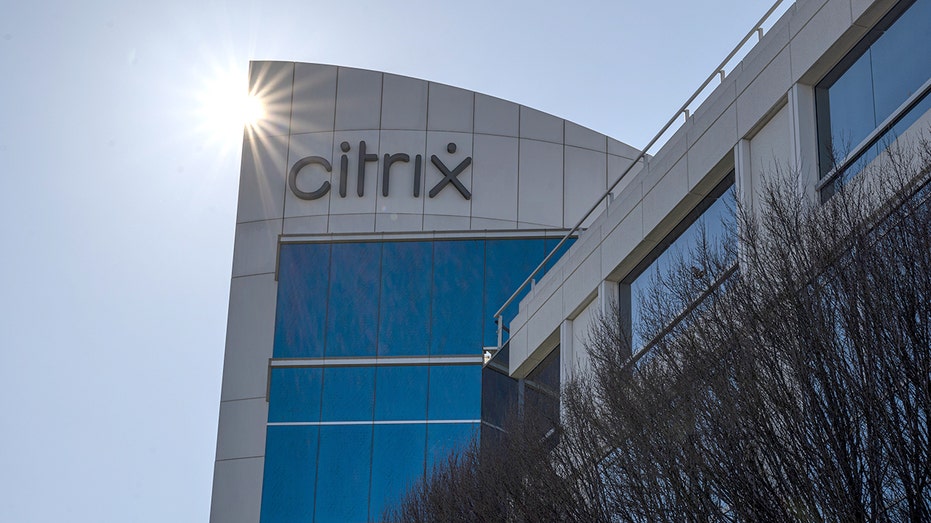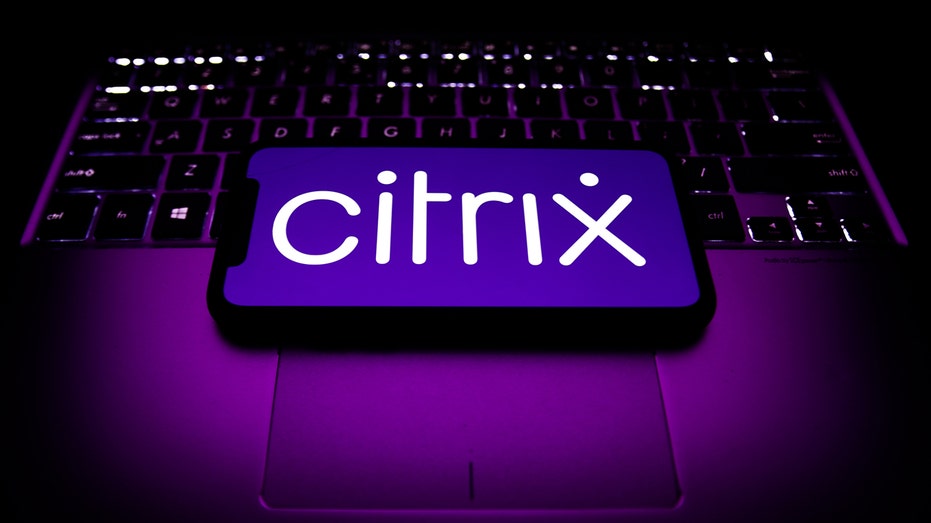Check out what’s clicking on FoxBusiness.com.
Cloud-computing company Citrix Systems Inc. is close to a roughly $13 billion deal to go private, continuing a spate of big leveraged buyouts that are powering record private-equity activity.
Stocks in this Article
$105.55
+4.84 (+4.81%)
Elliott Management Corp.’s private-equity arm, Evergreen Coast Capital, and Vista Equity Partners are near an agreement to pay $104 a share for the software company, according to people familiar with the matter.
The deal could be announced Monday, the people said, assuming the talks don’t fall apart or drag out.
GOOGLE TO INVEST $1B TO PUSH INDIA’S DIGITALIZATION
Should it go forward, the takeover would be the biggest leveraged buyout in recent months, ending the lull that followed a flurry of them in 2021.
With interest rates near historic lows, private-equity firms have amassed billions of dollars of cash from investors that they must put to work to begin earning fees on it.

Citrix headquarters in Santa Clara, California, U.S., on Wednesday, Jan. 19, 2022. Elliott Investment Management and Vista Equity Partners are in advanced talks to buy software-maker Citrix Systems Inc., according to people familiar with the matter.
In all, private-equity firms announced more than $900 billion worth of deals in the U.S. last year, including buyouts and exits, according to Dealogic.
Software companies like Citrix, with their predictable revenue, have become some of the most sought-after targets for private-equity firms because they can carry significant amounts of debt.
Vista is among the firms that specialize in software buyouts, and this would be among its biggest deals. Based in Austin, Texas, Vista manages more than $86 billion in assets and its chief executive, Robert Smith, is the wealthiest Black person in the U.S., worth $6.7 billion, according to Forbes. Founded in 2000, Vista is known for using a detailed playbook aimed at maximizing profits at the companies it buys.
The firm has been relatively quiet on the buyout front since October 2020, when Mr. Smith admitted to criminal tax evasion and agreed to pay $139 million in back taxes and penalties.
Citrix makes software that allows users to virtually access desktops as well as other cloud-computing capabilities.
MICROSOFT WARNS AZURE CUSTOMERS OF FLAW THAT COULD HAVE PERMITTED HACKERS ACCESS TO DATA
Citrix, like many legacy software companies, has had a rocky transition to a subscription-based model for its core virtual-desktop services. Converting customers into subscribers instead of licensees provides more recurring revenue, which investors like and have come to expect from software companies.
Citrix’s David Henshall in October stepped down as president and chief executive after investor pressure to explore a sale of the company. He also left as a director along with another board member, a move that reduced the board’s size to eight. The company tapped Chairman Bob Calderoni as interim CEO.
But Citrix has had some success lately, benefiting along with peers as more daily life takes place on the cloud and as the number of people working remotely soars. The company said in November that annualized recurring revenue in its third quarter grew 13% from a year earlier.
Its shares closed Friday at $105.55, and had already jumped on speculation of a deal over the past few months. Bloomberg reported Jan. 14 that Elliott and Vista were in advanced talks to buy Citrix.

Citrix logo displayed on a phone screen and a laptop keyboard are seen in this illustration photo taken in Krakow, Poland on October 30, 2021. (Photo by Jakub Porzycki/NurPhoto via Getty Images)
The hardware and software infrastructure Amazon.com Inc., Microsoft Corp. , Google and others provide is commonly referred to as the cloud.
The migration to the cloud has been happening for about a decade as companies have opted to forgo costly investments in in-house, information-technology infrastructure and instead rent hardware and software from the likes of Amazon and Microsoft, paying as they go for storage and data-processing. That has made cloud computing one of the most fiercely contested battlefields among business-IT providers and the companies that provide it a hot commodity among investors and acquirers.
That trend appears poised to continue.
Citrix’s modest size compared with that of peers such as VMware Inc. and spotty results over the years have made it the subject of periodic takeover speculation. Indeed, it has drawn the attention of private-equity firms and industry competitors in the past, though no deal was struck.
Citrix is expected to be combined with Tibco, a software company Vista agreed to buy in a $4 billion deal in 2014 and has tried to sell multiple times since then, some of the people said. That could afford opportunities to cut costs from overlapping functions and create a company more attractive to another buyer down the road or to public investors if and when the buyout firms decide to take it public again.
Elliott, founded by billionaire Paul Singer, manages roughly $48 billion in assets and has been one of the most visible activist investors in recent years, challenging companies including AT&T Inc. and Duke Energy Corp.
GET FOX BUSINESS ON THE GO BY CLICKING HERE
While best known for its activist investments, Elliott has been expanding its private-equity practice. Outside of Evergreen, which focuses on technology investments, Elliott owns other companies including bookseller Barnes & Noble Inc.
Elliott has a long history with Citrix. It holds a more than 10% stake worth over $1 billion and had been pushing it to take steps to boost its share price, The Wall Street Journal reported in September.
Elliott took a stake in Citrix in 2015 and held a seat on its board until last spring. The hedge fund has gone on to buy other companies it agitated at, including health-data company Athenahealth Inc., which it agreed to sell last year.


